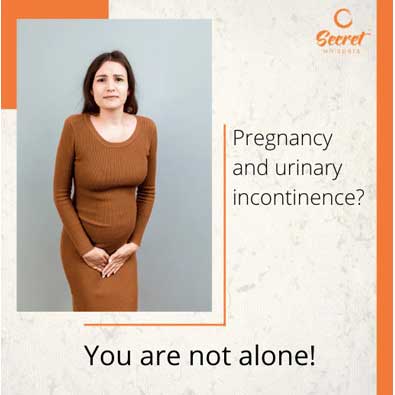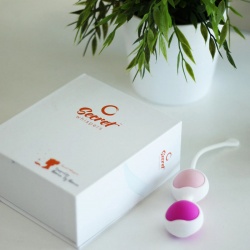Pregnancy & Urinary Incontinence

I'm very grateful to Secret Whispers who have allowed us to share their incredibly informative blog discussing the often hidden taboo of pregancy and bladder leakage.
The Ultimate Guide to Pregnancy Incontinence
In this week's blog we will discuss the hidden taboo of pregnancy and bladder leakage. We will answer all those questions you want to know on pregnancy incontinence.
Childbirth is an amazing event in a woman's life, but the period of pregnancy and childbirth also has a huge impact on the functioning of the women’s body and the pelvic floor in particular. I can imagine that many of you are asking - “what is a pelvic floor?” and by the end, you will be saying..... “Why did no one tell me all of this before?”
So let’s get started. When pregnant your pelvic floor is put under a lot of stress. Your pelvic floor is a group of muscles, a bit like a hammock that holds up your bladder, bowel and uterus. So, you can imagine the extra stress your pelvic floor is under when you are pregnant.
In an ideal world you would have been taught before and during pregnancy the importance of the pelvic floor and how to do your Kegels. Kegels are just the word for pelvic floor exercises. We advocate for this education to be taught in high schools. Kegels should be done twice a day to ensure it stays strong and therefore help avoid weak pelvic floor issues further on in life and with pregnancy and birth.
When pregnant, the increase in weight of the baby causes the pelvic floor muscles to constantly stretch, often to a point where they become weaker and less flexible which may cause urinary incontinence and prolapse. Learn more: Pelvic Organ Prolapse Symptoms
Childbirth does not always take place vaginally, so you may wonder if the method of giving birth is important in the context of the risk of urinary incontinence. YES, urinary incontinence after caesarean can occur in the same way as in vaginal childbirth as it results from the stretching of the pelvic floor muscles as the baby grows. In both cases, the period of pregnancy is the same and has a similar effect on the woman's body. However, incontinence is more likely to occur after vaginal delivery as it can stretch and weaken the pelvic floor muscles.
If you experience urinary incontinence during or after delivery we have you covered. We can advise how to seek help and support and how to do your Kegels correctly.
Is Incontinence a Sign of Pregnancy?
Yes, incontinence can be a sign of pregnancy, but doesn’t need to be... It can also be a sign of weak pelvic floor muscles. So, before you make any assumptions you should do a test or go to see a doctor.
Frequent urination can be a sign of early pregnancy, but it can also come back at a more advanced stage as the growing baby and the uterus begin to put pressure on the bladder. And while it may be annoying, in most cases it is nothing to worry about.
If you have a problem with incontinence during pregnancy you need to remember to take care of intimate hygiene, for example wear cotton underwear. Just in case, always have spare pants with you, and change them if necessary. Bacteria are conducive to infections in the intimate area, which means that the problem may worsen.
In addition, do not limit your drinks, especially if you are breastfeeding - it may dehydrate you. I know you may think that if you drink less, you will not leak, but it is not a solution to a problem. Less urine associated with fluid restriction also means a risk of inflammation of the urinary tract.
When Does Urinary Incontinence Start in
Pregnancy?
Urinary incontinence can start as soon as you realise you are pregnant, or even before that. Suddenly you need to go to the toilet all the time? Don’t worry, it is normal, and a lot of women have the same problem. The urinary incontinence can be mild for some woman, but for some more severe and frequent. So do not compare yourself to others, it is an individual matter. It can depend on your age and weight, your current pelvic floor strength and how many prior pregnancies you have had..
Most women experience the urinary incontinence in the second and third trimesters and a lot of experience leakage during the first three months after childbirth. Unfortunately bladder leaks after birth can increase the chances of developing postpartum depression. Postnatal Depression
To help you with incontinence during and after pregnancy, you need to remember that it is easier to prevent than cure. Thanks to daily pelvic floor exercises - Kegels, the muscles will benefit, they will be less likely to overstretch, but also the whole labor may run more smoothly. And the risk of urinary incontinence after having a baby can be much lower.
Why not check our program that will help you gain strength in your pelvic floor muscles. Your 4 Week Pelvic Floor Muscles Workout Programme Only £27 and you simply download all the videos to workout to whenever you want, use code TheNappyLady10 to get 10% off.
Is Incontinence Normal During Pregnancy?
No, incontinence is NEVER normal. It is common though. So don’t just hope it will go away, start working on your pelvic floor muscles straight away. Any sudden extra pressure on your bladder such as laughing, coughing, exercising, or sneezing may be a reason for your leakage, and it's called Stress urinary incontinence. This includes the same pressure that a child in pregnancy puts on your bladder.
If you have had a baby before you are more likely to have urinary incontinence, but it can happen even with the first baby. And if you had urinary incontinence before pregnancy, the symptoms may get worse.
How to Prevent Incontinence After Pregnancy?
Urinary incontinence after childbirth is an unpleasant and embarrassing issue for many. We here at Secret Whispers highly recommend that you see a pelvic floor physio as soon as you can and don’t just leave it and hope it will go away.
Like we have said, urinary incontinence during and after pregnancy is common but it is not normal.
Taking care of a baby can be difficult when a simple sneeze, laugh or even lifting the baby causes uncontrolled urine leaks. It is all due to the weakening of the pelvic floor muscles during pregnancy and childbirth. Happily, there are ways to deal with this problem!
To help prevent incontinence after pregnancy, you can:
- Do Kegel exercises
- Lost extra weight
- Avoid lifting
- Eat the right food
- Stop smoking
- Train your bladder
Kegels Kegels Kegels!!!
Instead of waiting for it to pass by itself, you should start training the strength of these important muscles. Tthe pelvic floor muscles are your core and needs to be strong.
It will take a few weeks to see any improvement. Its takes time, consistency and patience. You may feel as if you have no urinary control whatsoever, but don't give up! You will probably notice that it is better already a month after you start exercising. The most important thing here is regularity.
Also, do not give up training your Kegel muscles when the situation returns to normal. They will only stay strong as long as you do your Kegels.
To learn how to do the Kegels correctly check: What Is A Kegel?
Lost extra weight
Urinary incontinence lasts longer and is more common in mothers with extra kilos. So, try to control your weight. Why not try swimming, walking, or cycling? However, you should avoid high impact activities like jumping or heavy lifting because it can make your incontinence worse.
Avoid lifting
You should try to avoid heavy lifting for a few weeks after giving birth. Remember when you do need to lift, you should tighten your pelvic floor muscles before and during the lift. This helps to protect your pelvic floor.
Eat the right food
Try to follow a high-fiber diet to help prevent constipation. In addition, you should avoid caffeine, alcohol, and carbonated beverages. For example, try eggs, bananas, or nuts.
Stop smoking
It is obvious that you shouldn't smoke while you are pregnant because it puts the health of your baby at risk. But it is also bad for you, and it can cause urinary incontinence. So why not stop smoking after pregnancy as well? It can only bring you benefits :)
Train your bladder
Bladder training can be effective in treating incontinence. This includes increasing the amount of time between trips to the toilet and increasing the amount of fluid your bladder can hold.
It requires you to follow a fixed toilet schedule whether you feel the urge to urinate or not. When you find yourself needing to urinate before your designated time you should use urge suppression techniques like Kegels. So, think twice about those ‘Just in case wees' that you do before you leave the house. You are training your brain so that your bladder can only hold a small amount.

.jpg)